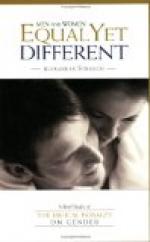Prior to the fall, then, it is quite evident that woman was equal to man in every respect. Did Eve, then, because she was first in the transgression, forfeit her right of equality with Adam, who just as flagrantly transgressed the Divine command; or was the penalty inflicted in consequence of her disobedience another matter altogether?
Genesis iii, 16, is usually brought forward to prove that, if woman was not inferior before the fall, she became so absolutely and unconditionally then. A disinterested reader—could such be found—would scarcely so render it. “Unto the woman he said, I will greatly multiply thy sorrow and thy conception; in sorrow thou shalt bring forth children, and thy desire shall be to thy husband, and he shall rule over thee.” Upon the latter clause of this verse, separating it from all connection with the former part of the sentence, with which, however, it is connected in the Sacred Word, is based the dogma of the continued, unchangeable curse of inferiority of all the daughters of Eve, and their obligation to serve and implicitly obey their husbands. And yet if a wife, in obedience to the command of her husband, violates the law, either of God or man, she is the party held responsible. If she is not possessed of sufficient mental capacity to judge for herself in all things, how can she know when she should obey or when disobey? If implicit obedience is her duty, is there any justice, then, in punishing her for obeying the order of him whom she is bound to obey? Those who construe this and other portions of the Word of God to suit themselves, would protest loudly enough against the “manifest injustice” if it were meted out to them. But we know there is no unrighteousness with God. The Bible expressly declares that “God is no respecter of persons,” and that “his ways are true and righteous altogether.”
If then we examine this text (Gen. iii, 16) candidly, even taking the generally accepted translation, and construe it with the same fairness with which we would construe a sentence the meaning of which was not in dispute, the conclusion arrived at would be very different from what it usually is; and it would be apparent that the words, “And thy desire shall be to thy husband, and he shall rule over thee,” has reference to the subject of generation, of which the entire passage treats. There are, however, some commentators who incline to the opinion that the words “and he shall rule over thee,” might with equal propriety be rendered, “He shall have power with thee.” We know that at this very time the promise of the Messiah—the seed that was to bruise the serpent’s head—was given to the woman. “He,” thy husband, “shall have power with thee,” would not then be an inappropriate termination to the sentence relating to generation. Raschi, a celebrated Hebrew writer and rabbi, who flourished in the twelfth century, supports this reading, “He shall have power with thee;” but the majority of commentators




